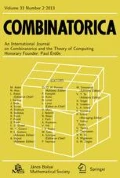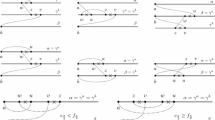G
and natural numbers n and q let G(G; n, q) be the game on the complete graph in which two players, Maker and Breaker, alternately claim 1 and q edges respectively. Maker's aim is to build a copy of G while Breaker tries to prevent it. Let . It is shown that there exist constants and such that Maker has a winning strategy in G(G; n, q) if , while for the game can be won by Breaker.
Similar content being viewed by others
Author information
Authors and Affiliations
Additional information
Received August 23, 1999
Rights and permissions
About this article
Cite this article
Bednarska, M., Łuczak, T. Biased Positional Games for Which Random Strategies are Nearly Optimal. Combinatorica 20, 477–488 (2000). https://doi.org/10.1007/s004930070002
Issue Date:
DOI: https://doi.org/10.1007/s004930070002




